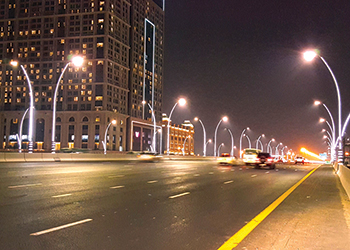RTA looks to expand smart LED plan
01 June 2017
Buoyed by the initial success of its smart LED lighting technology project, Dubai’s Roads and Transport Authority (RTA) is planning to expand the programme to other parts of the UAE emirate.
The initial project, which covered the bridges of the Dubai Water Canal, Sheikh Zayed Road as well as Al Barsha South 1 and 2 residential areas, is reported to have provided savings of up to 50 per cent on power consumption, says the authority.
Maitha bin Adai, CEO of RTA’s Traffic and Roads Agency, says the new technology facilitates central control of remote lighting units in real-time through a smart app tailor-made for the control room. This app receives feedback from the lighting units – which assists in monitoring the operational conditions of the lighting as well as in information sharing and executing operational commands for these units.
Another benefit of the system is that it automatically reports any crashes, which cuts the response time to emergency maintenance, and enhances the operational efficiency, she says. Smart, high-definition cameras have been installed to provide statistical data for monitoring the density of pedestrian movement in the locality.
Bin Adai says the smart lighting technology enables the RTA to control the lighting levels through preset fade-out programmes at certain times that generates additional savings due to the reduced power consumption and maintenance costs.
“LED lighting is one of the best environment-friendly technologies in curbing carbon emission, and producing high-level and symmetric lighting throughout the road,” she states.
The RTA is planning to study and develop technical specifications for smart lighting systems to bring it on par with the world’s top practices.
“The study will cover all aspects of the system – from on-site equipment and devices to the control room,” bin Adai elaborates. “It involves recommending and designing other feasible smart technologies, which can be integrated into the system. The study will also cover the latest technologies in clean and renewable energy that can be incorporated into the smart lighting system in support of the Green Economy strategy.”
Furthermore, with the support of a specialist consultant, the RTA is currently developing a masterplan for smart lighting in Dubai, which will be aligned with the best global practices and specifications.
“The plan will also map out services and resources required in future towards the implementation of the RTA’s vision of ‘Safe & Smooth Transport for All’,” says bin Adai.
Meanwhile, the RTA has signed a memorandum of understanding (MoU) with Philips Lighting to collaborate in the fields of lighting technology and power saving.
The agreement was signed by bin Adai and Paulo Cervini, senior vice president and president of Philips Lighting Middle East and Turkey.
The MoU will provide the latest lighting solutions, including smart lighting technology, control and monitoring of Dubai streets, footpaths and cycling lanes, as well as a wide network of roads and parks.
“Research teams from both parties will commission feasibility studies taking into consideration investment and operational aspects that meet road safety standards and the stipulations of Smart Dubai initiative to ensure the highest possible efficiency required for implementing innovative solutions,” bin Adai says.
 |
|
|
- Luceco shines in the region
- Feilo Sylvania has a control on usage
- New Dialight centre to serve EMEA
- Chicago Pneumatic wins big order
- Why lighting designs go wrong
- RTA looks to expand smart LED plan



